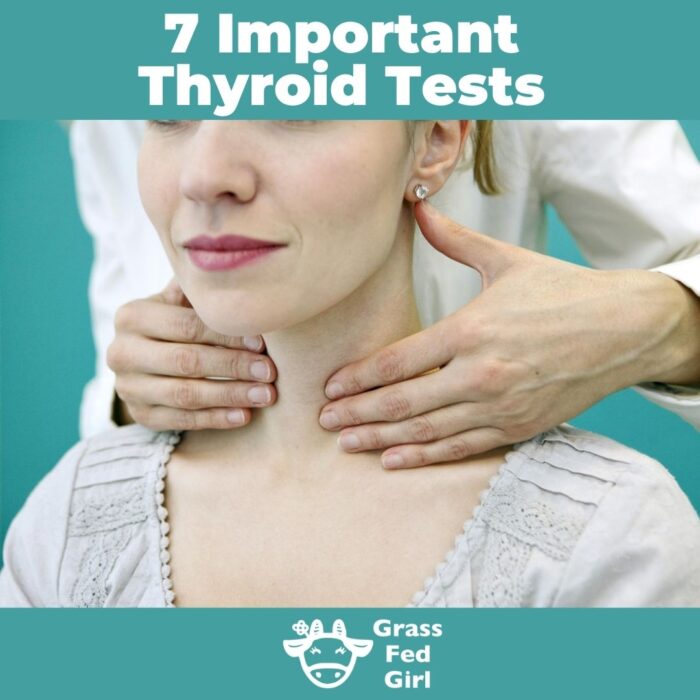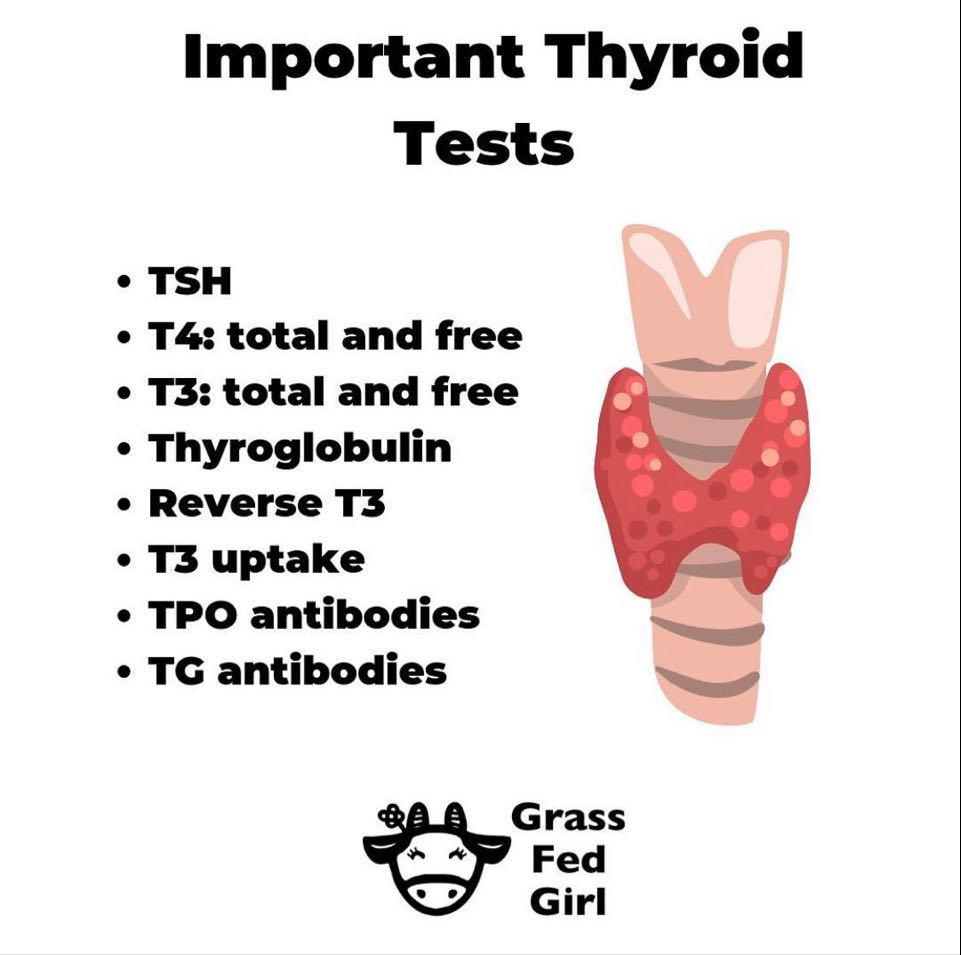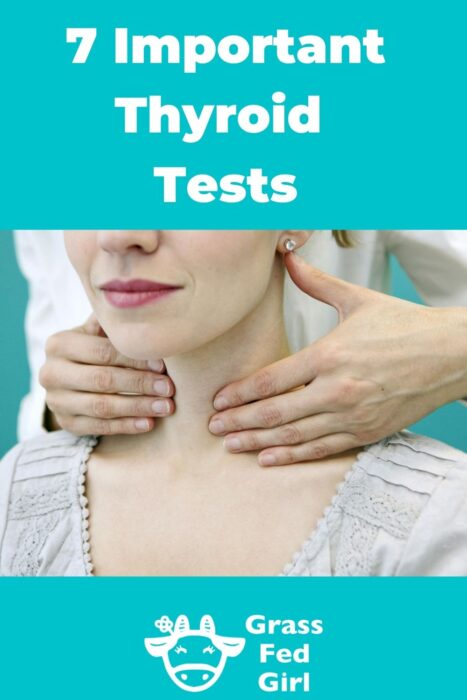Are you wondering which thyroid tests to ask for at the doctor? Thyroid disorders are very often under diagnosed or misdiagnosed. Many patients with normal lab results still have thyroid symptoms. One of the biggest mistakes people make while diagnosing or trying to treat any thyroid condition is not ordering a complete thyroid test.
That is why conventional thyroid treatments do not work because they do not address the underlying mechanism. When it comes to thyroid testing, many doctors don’t do an adequate work-up of thyroid function and send you home suggesting an anti-depressant or even birth control changes with no further clue about the cause of your symptoms.
Any treatment will be ineffective if the diagnosis is incorrect. Right? Testing is important as many people go undiagnosed or misdiagnosed when it comes to thyroid disorders. So, this article gives the information for successfully treating thyroid disorders by finding out the imbalance or cause. This post explains that thyroid conditions or dysfunctions that are not exposed or revealed with standard lab tests only and shows which tests are truly reflective of the actual condition inside. You can save 20% off by ordering your own lab testing from the comfort of home here.
I want to help anyone reading this, to not make the same mistakes I did. I talk about my thyroid disease journey and how I regained my health after changing my diet and lifestyle here. When I was first diagnosed with thyroid problems I was doing everything wrong diet wise! Here I share the top healthy foods for hypothyroidism support and my top nutritional tips to support underachieve thyroid problems here. And this article discusses 5 things your doctor won’t tell you about your thyroid.
Get the cutting edge info on thyroid health in a free holistic hypothyroid help e-course to make yourself better prepared to visit your doctor as an advocate for your own health here. Take 20% off on ordering your thyroid levels and antibodies testing here.

Which thyroid tests to ask for at the doctor?
A full thyroid panel is necessary to have a better picture of what is happening. It helps make real sense of symptoms. Each test is an individual piece of the puzzle which as a whole can help you better understand if symptoms are caused by the thyroid dysfunction, immune system, pituitary gland dysfunction or cellular resistance. Sometimes it is necessary to see test result in relation to other tests findings to understand the true picture and cause of your symptoms. This article explains in detail which thyroid tests to ask for at the doctor for successful diagnosis of thyroid dysfunction and identify true cause of your symptoms.
My readers get special 20% discount on ordering their lab work online from EverlyWell. Take 20% off on ordering your thyroid levels test here.

TSH
TSH is the thyroid simulating hormone produced by the pituitary gland in the brain. It signals the thyroid gland to produce more thyroid hormones T4 and T3. TSH test measures how much of this hormone is in your blood. It is high in case of hypothyroidism and low in hyperthyroidism. It is run to diagnose thyroid disease and determine medication dosage but it is not an adequate marker of thyroid function alone as it does not explain what thyroid gland is doing in response to TSH.
Total and Free T4
Thyroxine, T4 is the inactive form of thyroid hormone produced by thyroid gland. As compared to T3, this thyroid hormone is produced in a much larger amount. This inactive thyroid hormone needs to be converted to T3 that is an active form of thyroid hormone for a body to be used. So, adequate amounts of this hormone are needed for conversion. Total T4 measures both the amount of T4 in the body that is bound to a protein and what is free to be used as well. It helps asses if thyroid gland is properly functioning and making enough hormone. Free T4 measures the T4 that is not bound and available for cells to use that is more important to know than the T4 that is bound to a protein. Low levels of free T4 can be a sign of an underactive thyroid. Low level of free T4 with elevated TSH indicates the most common form of hypothyroidism due to disease in the thyroid gland. While a low free T4 along with a low TSH indicates hypothyroidism caused by pituitary dysfunction. People who have hyperthyroidism will have low TSH with an elevated free T4.
Total and Free T3
If your TSH and T4 levels appear to be normal but you still experience hypothyroid symptoms and feel something is missing? This may be under conversion of T4 to T3. Free T4 and T3 are essentially more accurate indications of thyroid function. Understanding their role in the body and why particularly T3 is more important makes it easy to draw a true picture while trying to figure out your thyroid issue and labs. T4 must be converted to T3 that is an active form of thyroid hormone for a body to be used. The poor conversion is caused by the raised cortisol levels and inflammation in the body. In this condition, body makes plenty of T4, but high cortisol levels prevent the body from being able to convert enough T4 to usable T3. Poor or under conversion of T4 to T3 is usually not diagnosed because a low T3 level does not affect TSH levels. So you need to make sure that your doctor is willing to test for Free T3 and T4 along with TSH. In case of poor conversion, you will have hypothyroid symptoms, but TSH and T4 will be normal. If you have your T3 tested, which it rarely is in conventional settings, it will be low.
Reverse T3
Reverse T3 is an inactive thyroid hormone that is opposite of free T3. During conversion of t4 to t3, a percentage of reverse t3 is also produced. Therefore it is a natural by-product of thyroid hormone production. Reverse t3 binds to t3 receptors on cells. They compete with each other at cellular level but as reverse t3 is biologically inactive, it does not give rise to any problem. It works as a natural buffer against hyperthyroidism. That is why reverse t3 is believed to be a natural protective mechanism to prevent thyroid over activity.
Problem occurs when reverse t3 levels increase relative to t3 levels. High levels of reverse t3 compete for receptor sites at cellular level. In this situation, thyroid receptors are blocked with lots of reverse t3 that prevents free t3 from binding to cells and do its job. Therefore patients feel symptoms of hypothyroidism even if their t3 levels are adequate and in range. So it is important to check both t3 and reverse t3 and consider these in relation to each other.
It is usually not a problem if free t3 levels are also within a good range. But it is important to work out why excessive amounts of thyroid hormone t4 is shunted towards producing reverse T3, leaving very few to be converted into the active thyroid hormone and when reverse T3 is elevated with respect to free T3. A few factors that can contribute to increase this conversion are adrenal stress, food allergens, lack of sleep, gut health, emotional stress, low fat and low calorie diets. Identifying the reason is integral to addressing the problem and improve conversion of T4 to more active form that is T3.
Reverse t3 is not tested in most cases. TSH, T4 and T3 are usually considered more useful in diagnosing and monitoring thyroid dysfunction for most of the patients with thyroid symptoms. So you should get tested for reverse t3 levels, if you have been under prolonged adrenal stress or if you are experiencing symptoms of hypothyroidism despite having adequate thyroid hormone levels. Reverse T3 is an important marker as it helps assess if there is poor conversion of T4 to T3 or if causes of stress need to be addressed or correcting other underlying factors will help. Hear our great podcast about healing adrenals here.
Thyroid Binding Globulin (TBG)
Thyroid binding globulin (TBG) is the transport protein that carries thyroid hormone through the blood. When thyroid hormone binds to TBG, it is inactive and not available to the tissues. When TBG levels become too much high, free thyroid hormone levels become low which leads to hypothyroid symptoms. TSH and T4 will be normal in such a situation while t3 will be low, and TBG and t3 uptake will be high if tested. Increase in TBG levels is caused by high estrogen levels due to birth control pills. Birth control pills and high estrogen levels increase the level of thyro-binding globulin which hinders thyroid hormone’s ability to bind to its receptor site. To treat this pattern, excess estrogen must be cleared from the body.zqa
Similarly, if TBG levels are low, levels of free thyroid hormone become high and too much free thyroid hormone in the blood makes the cells to develop resistance to it. Despite having enough thyroid hormone, cells can’t use it which leads to hypothyroid symptoms. In this pattern, T3 will be high, and T3 uptake and TBG will be low while if tested, TSH and T4 will be normal. Reduced TBG levels are caused by high testosterone levels. This pattern is associated with PCOS and insulin resistance specifically in women. Blood sugar management and reversing insulin resistance is the key to healing in this pattern.
T3 Uptake
This test is an indirect measure of thyroid hormone binding capacity and helps interpret the results of t4 and t3 blood tests. It measures the level of proteins that carry thyroid hormone in the blood. It helps assess thyroid function by measuring TBG levels in the blood. It is less used these days as it used to be due to development of T`2hyroid Binding Globulin (TBG) test and free t4.
Thyroglobulin
Thyroglobulin (TG) is the protein produced in and by the thyroid gland. It stores thyroid hormones before they are released into the blood. When stimulated by the pituitary gland, thyroglobulin breaks down and allows for the release of thyroid hormones (t4 and t3) into bloodstream. This test measures the amount of thyroglobulin in the blood. It is not a primary measure of thyroid function and not commonly used as a part of a thyroid function assessment. TG is produced in all healthy individuals and its levels are usually low. Increase in thyroglobulin levels are seen in Graves Disease, Hashimoto thyroiditis and thyroid cancer.
TPO and TG antibodies
Thyroid Peroxide (TPO) and Thyroglobulin (TG) antibodies are the basic underlying cause for hypothyroidism and hyperthyroidism in the United States. Studies show that 90% of people with underactive thyroid are producing antibodies to thyroid tissue which trigger the immune system to attack and destroy the thyroid gland which over time causes a decline in thyroid hormone levels but other thyroid labs may look normal. Therefore it is very important to at least ask your doctor to run Thyroid Peroxide (TPO) and Thyroglobulin (TG) antibodies to assess if your thyroid condition is auto-immune in nature. These antibodies testing is important marker that can give more information on whether an autoimmune disease is present.
The immune system of our body usually protects us from foreign invaders like bacteria and viruses by destroying them with antibodies produced by our blood cells. But in case of autoimmune disorder, antibodies that are produced by the body’s immune cells get confuse and attack the body’s own tissues. Similarly, autoimmune thyroid disorders are caused by antibodies that get confused and attack the thyroid gland. They can either turn on the thyroid which leads to Graves’ disease, hyperthyroidism or turn it off which leads to Hashimoto’s thyroiditis, hypothyroidism.
TPO antibodies and Thyroglobulin antibodies may be present before any other thyroid test is out of range. If thyroid antibodies are present and elevated then making a change in diet, lifestyle and nutrients can make a big difference in symptoms. Take 20% off on ordering your thyroid levels and antibodies testing here. Order your own lab work here.




